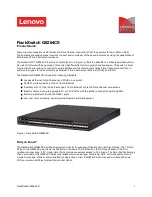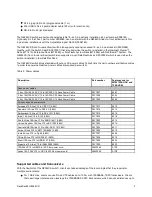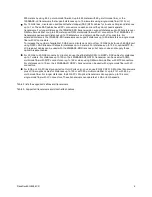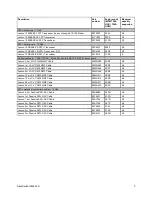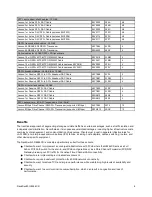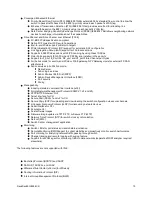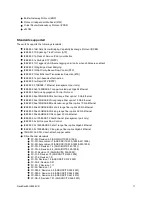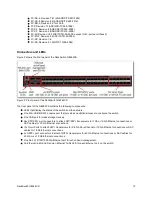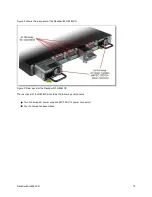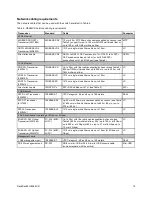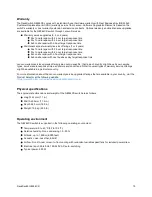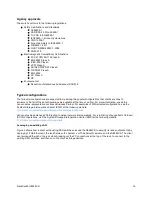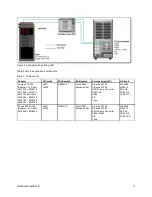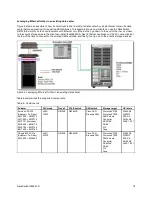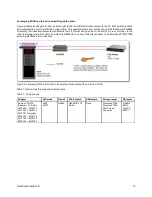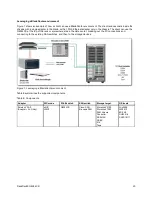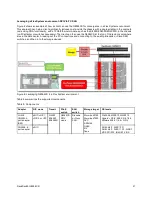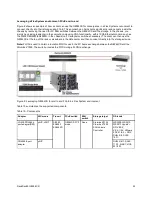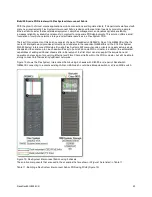
configuration/interoperability and VLAN assignments, and avoids any possible loops. By emulating a host NIC
to the data center core, it accelerates the provisioning of VMs by eliminating the need to configure the typical
access switch parameters.
Features and specifications
Note: Features and specifications listed in this section are based on Networking OS 7.8.
The RackSwitch G8264CS has the following features and specifications:
Form factor: 1U rack mount switch
RackSwitch G8264CS Rear-to-Front version for ports located in the rear of the rack matching System
x®, BladeCenter® and Flex System® designs
RackSwitch G8264CS Front-to-Rear version for ports located in the front of the rack matching airflow
of iDataPlex and NeXtScale System® designs
Ports
36 ports for 1 Gb or 10 Gb Ethernet SFP/SFP+ transceivers (support for 1000BASE-SX, 1000BASE-LX,
1000BASE-T, 10GBASE-SR, 10GBASE-LR, or 10GBASE-ER) or SFP+ direct-attach copper cables.
SFP+ modules and DAC cables are not included and must be purchased separately (see Table 3).
12 Omni Ports, each of which can operate as a 10 Gb Ethernet (support for 10GBASE-SR, 10GBASE-
LR, 10GBASE-ER or 10 GbE SFP+ DAC cables), or auto-negotiating 4/8 Gb Fibre Channel, depending
on the SFP+ transceiver installed in the port. SFP+ modules and DAC cables are not included and
must be purchased separately (see Table 3).
Note: Omni Ports do not support 1 Gb Ethernet SFP transceivers.
4 ports for 40 Gb Ethernet QSFP+ transceivers, QSFP+ to QSFP+ DAC cables, or QSFP+ to 4x 10 Gb
SFP+ break-out cables. QSFP+ modules and DAC cables are not included and must be purchased
separately (see Table 3).
One 10/100/1000 Ethernet port (RJ-45 connector) for out of band (OOB) management
One RS-232 serial port (mini-USB connector) that provides an additional means to configure the switch
One USB port for mass storage devices
Scalability and performance
1 Gb, 10 Gb, and 40 Gb Ethernet ports for bandwidth optimization and performance
Up to 64 10 Gb Ethernet SFP+ connections (with optional break-out cables)
Non-blocking architecture with wire-speed forwarding of traffic and aggregated throughput of 1.28
Tbps
Media access control (MAC) address learning: automatic update, support for up to 128,000 MAC
addresses
Up to 128 IP interfaces per switch (IP interface 128 is reserved for out-of-band management)
Static and LACP (IEEE 802.3ad) link aggregation, up to 64 trunk groups with up to 32 ports per trunk
group
Support for jumbo frames (up to 9,216 bytes)
Broadcast/multicast storm control
IGMP snooping to limit flooding of IP multicast traffic
IGMP filtering to control multicast traffic for hosts participating in multicast groups
Configurable traffic distribution schemes over trunk links based on source/destination IP or MAC
addresses, or both
Fast port forwarding and fast uplink convergence for rapid STP convergence
Availability and redundancy
Virtual Router Redundancy Protocol (VRRP) for Layer 3 router redundancy
IEEE 802.1D STP for providing L2 redundancy
IEEE 802.1s Multiple STP (MSTP) for topology optimization, up to 32 STP instances are supported by a
single switch
IEEE 802.1w Rapid STP (RSTP) provides rapid STP convergence for critical delay-sensitive traffic like
voice or video
Per-VLAN Rapid STP (PVRST) enhancements
Layer 2 Trunk Failover to support active/standby configurations of network adapter teaming on
compute nodes
RackSwitch G8264CS
8

